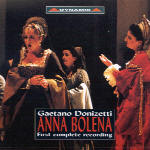Although advertised as the “first complete recording” of this opera, it simply is not–both Sills’ and Sutherland’s recordings are equally “complete”, unless I missed a line or two of recitative in this new set that’s not included in the older recordings. That aside, this is a worthy competitor and a mighty fine performance. Perhaps it’s the live ambience that helps this reading, but what we have here is very satisfying. Conductor Tiziano Severini knows singers, understands bel canto, refuses to overplay the oom-pah aspects of the score, genuinely believes in the music’s worth, and keeps the three-hour-plus event exciting and moving. Similarly, his orchestra plays beautifully, and the recording balance allows us to hear some of Donizetti’s more subtle woodwind writing. Severini doesn’t always have his singers take high optional endings to arias, duets, and ensembles–not only because of their abilities, but clearly because he wisely does not want every number to be either a show-stopper or a star turn.
Starting at the bottom of the vocal roster, we find bass Andrea Papi as Enrico, and his is a dark, menacing sound, full of imperiousness and arrogance. He has a slight inclination to flat at the top of his range, but it hardly gets in the way. Tenor Fabio Sartori as Percy has a voice that is pliable, exciting, and ringing; his phrasing is intelligent, and he sings every note, although he does slow down for the few coloratura passages. You might argue that he sings a bit too veristically–it is easy to tell where his career is going. Like the bass, but a bit worse, he tends to almost flat on very top notes.
Sonia Prina does what she can with the ungrateful, unlikeable role of Smeton; she sings her aria well and with wisely inflected words. Sonia Ganassi is a fine singer and her Giovanna Seymour is a success; she gives us a complete picture of this conflicted character. I don’t like to carp, but I find her sound as such to be absolutely generic; I couldn’t pick her out in a crowd (and this is hardly the case with Simionato or Verrett on other recordings). In other words, she lacks distinction but remains a fine artist. In the pivotal role of Anna, Dimitra Theodossiou exhibits a handsome voice, along with the requisite melancholy and outrage needed but not quite the nobility that, say, Callas or Sills brought to the role. She opts for nice, originally-placed high notes in embellished sections, and if the very highest notes are less than glorious, well, whose besides Sutherland’s are not? They’re pretty exciting as they stand. She is clearly a creature of the lyric theater with great instincts, and lovers of bel canto and opera in general have something to look forward to if her career is managed wisely.
Especially considering that this recording is taken from live performances, the engineers have done an amazing job: balances are almost always true, even in large ensembles; various parts of the orchestra shine through; stage noise rarely intrudes; and only occasionally do we get that big-theater sound. This set may not replace my Sills-Verrett or Callas-Simionato recordings, but it can sit proudly next to them.
































